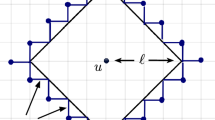Abstract
We prove infinite differentiability of the magnetization and of all quenched correlation functions for disordered spin systems at high temperature or strong magnetic field in the presence of Griffiths' singularities. We also show uniqueness of the Gibbs state and exponential decay of truncated correlation functions with probability one. Our results are obtained through new simple modified high temperature or low activity expansions whose convergence can be displayed by elementary probabilistic arguments. Our results require no assumptions on the probability distributions of the random parameters, except for the obvious one of no percolation of infinite couplings, and, in the strong field situation, for the also obvious requirement that zero magnetic fields do not percolate.
Similar content being viewed by others
References
Griffiths, R.B.: Non-analytic behavior above the critical point in a random Ising ferromagnet. Phys. Rev. Lett.23, 17–19 (1969)
Fröhlich, J.: Mathematical aspects of the physics of disordered systems. In: Critical Phenomena, Random Systems, Gauge Theories. K. Osterwalder, R. Stora (eds.), Amsterdam Elsevier, 1986
Süto, A.: Weak singularity and absence of metastability in random Ising ferromagnets. J. Phys.A15, L749-L752 (1982)
Sylvester, G.S.: Representations and inequalities for Ising model Ursell functions. Commun. Math. Phys.42, 209–220 (1975)
Kesten, H.: Percolation Theory for Mathematicians. Basel, Boston: Birkhauser, 1982
Klein, A.: Who is afraid of Griffiths' singularities? In: Micro, Meso and Macroscopic Approaches in Physics. A. Verbeure, ed., New York: Plenum, to appear
Olivieri, E., Perez, J.F., Rosa Jr, S.G.: Some rigorous results on the phase diagram of dilute Ising systems. Phys. Lett.94A, 309 (1983)
Perez, J.F.: Controlling the effect of Griffiths' singularities in random ferromagnets. Braz. J. Phys.23, 356–362 (1993)
Berretti, A.: Some properties of random Ising models. J. Stat. Phys.38, 483–496 (1985)
Fröhlich, J., Imbrie, J.: Improved perturbation expansion for disordered systems: Beating Griffiths singularities. Commun. Math. Phys.96, 145–180 (1984)
Bassalygo, L., Dobrushin, R.: Uniqueness of a Gibbs field with random potential-an elementary approach. Theory Probab. Appl.31, 572–589 (1986)
Fröhlich, J., Zegarlinski, B.: The high temperature phase of long range spin glasses. Commun. Math. Phys.110, 121–155 (1987)
Zegarlinski, B.: Spin glasses and long range interactions at high temperature. J. Stat. Phys.47, 911–930 (1987)
Kesten, H.: Aspects of first passage percolation. In: École d'Eté de Probabilités de Saint-Flour XIV, P. L. Hennequin (ed.) 125–264, Lecture Notes in Mathematics1180, Berlin, Heidelberg, New York: Springer, 1986
Author information
Authors and Affiliations
Additional information
Communicated by T. Spencer
Partially supported by the CNPq and FAPESP.
Partially supported by the NSF under grants DMS-9208029 and INT-9016926.
Partially supported by the CNPq.
Rights and permissions
About this article
Cite this article
von Dreifus, H., Klein, A. & Perez, J.F. Taming Griffiths' singularities: Infinite differentiability of quenched correlation functions. Commun.Math. Phys. 170, 21–39 (1995). https://doi.org/10.1007/BF02099437
Received:
Revised:
Issue Date:
DOI: https://doi.org/10.1007/BF02099437



